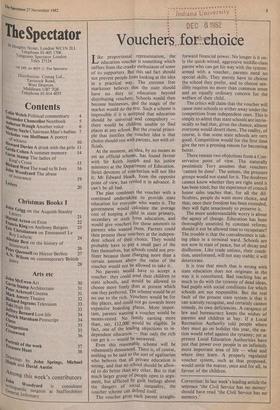Vouchef forrehoi6e
T ike proportional representation, the I—, education voucher is something which suffers from the cranky enthusiasm of some of its supporters. But this sad fact should not prevent people from looking at the idea in a practical way. The extreme free marketeer believes that the state should have no duty to education beyond distributing vouchers. Schools would then become businesses, and the magic of the market would do the rest. Such a scheme is impossible if it is accepted that education should be universal and compulsory there would be children unable to find places at any school. But the crucial princi- ple that justifies the voucher idea is that choice should rest with parents, not with of-
ficials. At the moment, an idea, by no means as yet an official scheme, has found favour with Sir Keith Joseph and his junior ministers at the Department of Education. Strict devotees of voucherism will not like it; Mr Edward Heath, from the opposite point of view, has reviled it in advance. It can't be all bad.
The plan combines the voucher with a continued undertaking to provide state education for everyone who wants it. The government would calculate the average cost of keeping a child in state primary, secondary or sixth form education, and would give vouchers for those amounts to parents who wanted them. Parents could then present these vouchers at the indepen- dent school of their choice. They would probably have to pay a small part of the fees themselves, but schools could not pro- fiteer because those charging more than a certain amount above the value of the voucher would not be allowed to take it.
No parents would have to accept a voucher: they could send their children to state schools, and would be allowed to choose more freely than at present which one they preferred. The scheme would be of no use to the rich. Vouchers would be for day places, and could not go towards more expensive boarding places. More impor- tant, parents wanting a voucher would be means-tested. No family earning more would be eligible. In than, say, £12,000 fact, one of the leading objections to in- dependent education — that only the rich can get it — would be answered.
Even this reasonable scheme will be vehemently denounced. There is, of course, nothing to be said to the sort of egalitarian who believes that all private education is wrong, and that no school should be allow- ed to do better than any other. But to that much larger group of people open to argu- ment, but afflicted by guilt feelings about the dangers of social inequality, the voucher scheme can defend itself.
The voucher gives each parent straight-
forward financial power. No longer is it on- ly the quick-witted, aggressive middle-class parent who can get his way with the system: armed with a voucher, parents need no special skills. They merely have to choose the school they prefer, and to choose sen- sibly requires no more than common sense and an equally ordinary concern for the welfare of their child.
The critics will claim that the voucher will cause state schools to wither away under the competition from independent ones. This is simply to admit that state schools are intrin- sically so bad that, given the chance, almost everyone would desert them. The reality, of course, is that some state schools are very good. Competition would for the first time give the rest a pressing reason for becoming better.
There remain two objections from a Con- servative point of view. The naturally pessimistic Tory assumes that vouchers `cannot be done'. The unions, the pressure groups would not stand for it. The doubters cannot know whether they are right until it has been tried; but the experience of council house sales teaches that, for all the dif- ficulties, people do want more choice, and that, once their freedom has been extended, they will fight tenaciously to preserve it.
The more understandable worry is about the agony of change. Education has been thoroughly unsettled by constant reform; should it not be allowed time to recuperate? The trouble is that the convalescence is tak- ing place in a terminal ward. Schools are not now in state of peace, but of decay and disillusion. Like trade unions, their condi- tion, unreformed, will not stay stable; it will deteriorate.
It is true that much that is wrong with state education does not originate in the way it is constituted. Bad teaching has as much to do with the tyranny of dead ideas, bad pupils with social conditions for which schools are not responsible. But the real fault of the present state system is that it can scarcely recognise, and certainly cannot remedy, its own deficiencies. A carapace of law and bureaucracy keeps the wishes of parents and children at bay. If a Local Recreation Authority told people where they must go on holiday this year, the na- tion would rebel against the tyranny; yet at present Local Education Authorities have just that power over people in an infinitely more important area of life — what and where they learn. A properly regulated voucher system, such as that proposed, would settle the matter, once and for all, in favour of the children.










































 Previous page
Previous page